 |
 |
 |
 |
 |
 |
 |
 |
 |
First Division - Elland Road - 39,335
Scorers: Clarke (36)
Leeds United: Harvey, Reaney, Cherry, Bremner, McQueen, Hunter, Lorimer (Jones 46), Clarke, Jordan, Yorath, Madeley<
Burnley: Stevenson, Noble, Newton, Dobson, Waldron, Thomson, Nulty, Casper, Fletcher, Collins (Ingham 70), James
On 9 February, the Whites' 2-0 beating of Manchester United at Old Trafford
extended their advantage over second-placed Liverpool to nine points with
thirteen games left to play; at that stage, Leeds appeared certain to
reclaim the league title they had won for the first time in 1969. In the six chaotic weeks that followed, Leeds had crashed out
of the FA Cup at the hands of Second Division
Bristol City, seen their 29-game unbeaten
run in the First Division destroyed at Stoke and taken just
four points from five games. Their previous game had brought possibly the most damaging result
of all. A week before the Burnley fixture, they slipped to a dispiriting
single-goal defeat at Anfield, with Liverpool seizing a psychological
advantage as they continued to build their momentum. The Reds
were coming up on the rails with a surge which had seen them drop
just three points from nine games. Frayed nerves jangled at Elland Road; Don
Revie's men looked as if they were going to suffer another
of the bitter disappointments that had characterised the decade
since their return to the top flight in 1964. Against Liverpool, United had come close to securing the point
they had sought, the only goal coming in the closing minutes. Geoffrey Green in The Times: 'When Heighway slid home the ball
eight minutes from the end at bulging Anfield on Saturday for Liverpool's
crucial 1-0 victory over Leeds United, the race for the league championship
began more and more to resemble the fable of the hare and the tortoise. 'Only a few crowded weeks ago Leeds wallowed in the comfort of a nine
points lead at the top. Now that gap has been eroded to six and Liverpool,
in addition, hold two games in hand with the chance to cut it even finer.
Leeds, their goalscoring thrust recently misplaced, are now looking anxiously
over their shoulders, remembering no doubt how they conceded a seven points
advantage to Arsenal for the title of 1971. 'Liverpool, the reigning champions, are not yet disposed to surrender
their throne. Unbeaten since Boxing Day in a run of 16 games, once more
they are proving themselves the strongest finishers in the business at
a time when their main rivals have won only three of their last eight
matches. And further to underline Liverpool's patient hunt, it may be
added that this was the thirteenth occasion this season they had won a
match inside the last ten minutes. Here lies the character of a side who
have conceded only one goal in the last nine games. 'Yet certain facts could tell against them before it is all over. For
instance, they are still involved in the semi-final round of the FA Cup;
Leeds possess by far the superior goal average; and the single month of
April will see Liverpool involved in all their final nine League matches
(most of them away from Merseyside), a stern enough test even for one
of their strength and determination. Fixture congestion could well be
the final arbiter. 'All that lies in the future. Meanwhile, here was a stirring battle of
wills and wits that helped to keep the race still open. All too often
these summit meetings provide anti-climax. Not so on this occasion. With
courage and sportsmanship uppermost, this was British football at its
best. 'Bill Shankly, the Liverpool manager, said it all at the end: "Never
mind the championship. Here was a great match, something the public wanted
after recent sad events." To which Don Revie, his Leeds counterpart,
added: "It was a first class advertisement for football." How
pleasant to be able to endorse such opinion. 'With queues already forming soon after breakfast - the gates shut on
a 56,000 crowd an hour and a half before the kick off - the expectation
inside Anfield was sweet and giddy. The flags of the stadium stood starched
in the wind as Liverpool thundered into attack with a gusty energy for
most of the afternoon. But Leeds, quick as a serpent, time and again slid
out of danger with subtle defensive covering. 'The battle flashed and winked like a prism and just as Leeds, at last
able to slow the withering pace with possession play, began to suggest
they might weather the rattling storm, the decisive blow was struck. We
were already clockwatching 'They had much to look back on - the probing Callaghan, Cormack and Hughes
of Liverpool, and Hunter, the warhorse of Leeds, as the outstanding medal
winners of 22 heroes; a couple of breathtaking goal line saves, first
by Hunter from Toshack and then Hughes from Lorimer, when all seemed lost. 'There was a clear cut chance five minutes from the interval when Toshack,
unmarked close in, headed over from a short corner worked by Heighway
and Cormack. That went west but in the end persistence rightly won the
match.' 'I think they deserved to win,' admitted Don Revie afterwards. 'They
kept up the pressure for 75 minutes and while we are disappointed, it
is no disgrace to lose to Liverpool. But after the troubles in the game
lately, for two teams to go and compete so honestly I think was tremendous. 'Yes, I'm still confident of winning the title … Anyone who looks at
it sensibly will see that Liverpool have got to take maximum points from
their games in hand and they will still be two points behind - and our
goal average is so much better. Look at the two positions and decide which
you would sooner be in. 'People said before Saturday's match at Anfield that it would decide
the title but I didn't. I have said all along that you have got to be
consistent over 42 matches - now we have to be consistent over the last
eight.' To lose such a crucial game so late in the day was demoralising.
For Revie's men, then, the visit of Burnley to Elland Road on
23 March was of the utmost importance. The Turf Moor outfit themselves had promised much earlier in
the campaign, being among the front runners, buoyed by double
silverware in the form of the Second Division championship trophy
and the Charity Shield after defeating Manchester City at Maine
Road. Now, though, they were sitting eighth in the table, distracted
by an FA Cup run that had taken them to the semi-finals where
they would face Newcastle United the following week. Relations between United and Burnley had long been strained,
with the Elland Road club incensed by remarks made by Turf Moor
chairman Bob Lord, Rob Bagchi in The Guardian: 'The chairman known to Arthur Hopcraft
in The Football Man as "the Khrushchev of Burnley", ran
the club in such a belligerent fashion that he became arguably the first
club owner to have a truly national profile. Fans of Arsenal would know
all about Denis Hill-Wood and Tottenham supporters would recognise Sidney
Wale but Lord's outspokenness about the Football Association and penchant
for banning reporters from the Turf Moor press box gave him a notoriety
in the 60s and 70s that still endures. 'Such was his "I say what I like and I like what I bloody well say"
style that he became the epitome of the Lancashire self-made businessman
- to the extent that it would be no surprise to hear that Timothy West
used him as an inspiration for his portrayal of Bradley Hardacre in the
sitcom Brass. Presiding over the club and his butchery business
from his office at his Lowerhouse meat factory, he orchestrated feuds
with the governing bodies, newspapers, supporters' clubs, television companies,
other teams and even the Clarets' greatest player. 'He first made his mark when he described Manchester United's players
as behaving like Teddy Boys after Burnley beat them 3-0 in March 1958
only weeks after the Munich Disaster. The remark caused outrage but he
never apologised, instead embarking on an orgy of hair-splitting before
blaming a journalist "trespasser" for having the temerity to
record his rebuke. Burnley fans could forgive him that but the way in
1963 he got rid of Jimmy McIlroy, the radiant star of the championship-winning
side, would have 'It took McIlroy until 1999 to break his silence and reveal that his
friendship with the Burnley director Reg Cooke turned the chairman against
him. His captain, Jimmy Adamson, McIlroy said, cautioned him that Lord
would be put out by the closeness of his relationship with another board
member and shortly after the warning the Northern Ireland inside-forward,
says the manager, Harry Potts, was summoned to the factory on a Sunday
morning and told "McIlroy has to go." 'When Potts protested, he was informed that he would be out too unless
he agreed to put his best player on the transfer list. And so the team
shrewdly put together by Potts, bolstered by raids on the North East talent
pool led by the scout and British Rail clerk Jack Hixon, who later took
Alan Shearer to Southampton, began to break up and the catalyst was the
chairman's pique. 'After relegation, a decade later another fine Burnley team won promotion
in 1973 with Martin Dobson, Colin Waldron and Leighton James to the fore.
At the end of the 70s Terry Venables' young Crystal Palace side were ludicrously
described as "the team of the 80s" but the phrase had a history
- Adamson, the manager who took Burnley up, had said nine years earlier
that he was going to make the Clarets "the team of the 70s".
Unsurprisingly, he failed, but not before Lord had made an intervention
during their first season back in the top flight that ought to have turned
him into a pariah. 'Having argued throughout his time at Turf Moor that TV coverage was
a threat to the game's survival, he chose his speech at a Variety Club
function to address his concerns. "We have to stand up against a
move to get soccer on the cheap by the Jews who run television,"
he said. 'Obviously, it caused great offence but the most remarkable thing was
Lord's umbrage at the reaction of Leeds' Jewish chairman Manny Cussins,
who said he would walk out of the Elland Road boardroom if Lord came to
Burnley's match there. Lord was indignant that Cussins had been critical
of him and ordered his board to stay away from the game. It was a neat
trick, turning the offended into the offender, and, astonishingly, he
managed to get away with it.' For the game, United selected the same eleven that had been on
duty at Anfield. Leading scorer Mick Jones passed a fitness test,
but was named once more as substitute. Joe Jordan continued to
lead the forward line and Terry Yorath sported Johnny Giles' No
10 shirt with the Irishman unavailable because of the hamstring
injury he had sustained against Stoke a month earlier. Burnley recalled centre-forward Paul Fletcher after two matches
out with a bout of flu and Jimmy Adamson named the eleven he expected
to face Newcastle the following week in the Cup semi-final. Before the action commenced, Manny Cussins presented a £100 cheque
to Ray Hardy, who had recently resigned from the role of groundsman
he had filled for eight years. Billy Bremner presented Hardy with
a silver salver on behalf of the United players. Burnley were the first team to show in attack, and first Norman
Hunter and then Gordon McQueen had to intervene to counter their
thrusts. Almost immediately, Welsh international winger Leighton
James swung over a dangerous-looking centre which United were
grateful to clear. James then showed skill and pace to get the
better of Yorath and when he put the ball in Fletcher shot over
the bar as he came under pressure from Paul Madeley. After weathering that early storm, Leeds managed to exert some
pressure of their own when Jordan combined with Bremner in a forward
move, but Yorath's shot from the edge of the area came to nothing. Paul Reaney found Bremner making good ground down the right As they strove to settle their nerves with an early goal, United
looked defensively suspect. After Peter Lorimer saw former England
full-back Keith Newton deflect his goalbound effort so that it
found only the Burnley woodwork, at the other end United keeper
David Harvey had to gather a long range effort from Frank Casper.
It was a prelude to the breakthrough and Leeds fell into arrears
after 17 minutes. Burnley were awarded a free kick out on their left, around forty
yards from goal. Midfielder Doug Collins swung a lob deep into
the heart of the area and Fletcher rose above Hunter to meet it,
the ball dropping near the byline. Casper cut it back to the six-yard
line and Fletcher calmly stabbed home, Harvey's weak block insufficient
to prevent the ball finding the net off the base of the upright. Don Revie wriggled angrily in his seat, bitterly complaining
about his rearguard's lack of concentration. United did their best to lift Revie's mood, but Trevor Cherry
shot wide and Lorimer continued to bemoan his luck, coming in
for some penalty area buffeting and seeing spread-eagled goalkeeper
Stevenson blocking a shot with his legs. Stevenson then dived
to block a close range shot from Clarke. Strong challenges were coming thick and fast now from both teams;
Fletcher required treatment to his ankle after a Cherry tackle
and then Yorath was felled from behind by Peter Noble. The home side pressed Burnley back and earned a corner after
Stevenson kicked clear. When Bremner sent the flag kick over,
McQueen struggled to get in a header and Noble blocked away, but
a diving Clarke was at hand to nod the rebound goalwards. Newton
managed to dig the ball out with his head but referee Roy Capey
declared that it had already crossed the line and awarded the
goal to bring United level after 36 minutes. The home crowd's celebrations had hardly died away before Burnley
reclaimed the lead five minutes later with a spectacular goal,
later lauded by Turf Moor fans as the goal of the decade. When a high ball from Noble dropped into the heart of the United
defence, Nulty risked life and limb to beat McQueen and nod it
on. Fletcher shifted his position under the falling ball and launched
himself into an acrobatic overhead kick, ignoring the incoming
challenge from Hunter. His strike was perfect and flew past Harvey
into the net. Coming so close to the interval, the goal was a devastating blow.
The air in the dressing room was blue as Don Revie sought to revive
flagging spirits. He sent Mick Jones on as replacement for an
out of touch Lorimer, but there was no immediate improvement with
Burnley quickly back on the attack. Harvey had to dive full length
to palm away a cross from Newton which shaved the head of Fletcher. When United did force Burnley onto the defensive, Madeley came
close with a fierce shot before Jones sent a back header just
wide and Stevenson brought off a fine save from Cherry. Waldron
kicked a Yorath shot off the line though the whistle had already
sounded for a foul on the goalkeeper. United stayed on attack
with Jones and Jordan battling away but Harvey had to be alert
when Burnley broke quickly and James got in an angled shot. Despite there being plenty of time for United to get Billy Bremner acknowledged as much. 'Everybody seemed obsessed with charging
forward. There did not seem any way of stopping it. That's why there was
no cover and that's why it was so easy for Burnley to break and score
against us,' he said afterwards. United struggled manfully but found the greatest difficulty in
fashioning a clear opportunity against spirited opponents and
their task was made even harder when Burnley added a third goal
in the 62nd minute. Madeley lost the ball to Nulty who conspired with Dobson, Casper
and Fletcher to leave Collins, unattended in the middle outside
the box, with the space and time to send an inch perfect chip
over Harvey and into the net off the far post. United responded instantly, but Bremner was disappointed when
Stevenson denied him from range with another fine save. Burnley stunned the home defence again in the 69th minute, taking
a commanding 4-1 lead. Collins' free kick was headed down by Waldron
and Nulty, scrabbling around on his knees, used the only other
available part of his body to score a fourth, heading home from
close range. Burnley manager Jimmy Adamson immediately brought on midfielder
Billy Ingham for Collins. Ten minutes from time there was an ugly moment when Casper was
injured in a tackle by Hunter. The Burnley man had to be stretchered
off and Turf Moor fans never forgave Hunter, accusing him of cowardice
and being a sore loser. Casper was a fans' favourite and had just returned from the knee
injury he sustained against Tottenham in September. Casper recalls: 'I got injured on the running track behind the goal.
I'd gone past Norman Hunter down the flank, left him for speed and crossed
the ball. Fletch headed the ball and it hit the crossbar and came out.
I carried on running but Norman Hunter followed me off the field and gave
me a big kick. Unfortunately it was behind my bad knee. If it had been
my other knee I would probably have been all right.' The tackle effectively ended Casper's career. He injudiciously
but understandably chose to hobble into In the remaining minutes of the game, Leeds pushed hard, Jordan
and McQueen receiving cautions for overly zealous interventions,
but Burnley had the game in their pockets and nearly added a fifth
near the end. James chipped the ball over Harvey and saw it roll
along the goal line before Hunter hooked clear. It would have
been mere icing on the cake, for at the finish they were comfortable
victors. Tom German in The Times: 'Not only the fringes are a little frayed
at Elland Road; the fabric itself is beginning to look a bit forlorn.
The strands of total composure and intuitive skills which Leeds United
drew together so successfully for so long, seem at last to have been tugged
awry by the constant tension so that the side so comprehensively beaten
4-1 by Burnley on Saturday was barely identifiable as that which once
so imperiously dismissed all who dared tilt at them. 'It is an inadequate explanation for Leeds' first home defeat in the
championship that almost everything Burnley touched near goal turned to
gold while the Yorkshiremen's best chance found an obstruction in the
way either fortuitously or because Stevenson was in such splendid form
in the Burnley goal. Leeds had so much more of the ball. 'The attack knew that their function was to move forward but were not
quite sure which direction to take; a fully fit Giles, had he been playing,
could perhaps have corrected their course. It was at the back, though,
where they are usually so secure, that Leeds floundered. 'Once there was invariably someone moving into position to cover indiscretions;
now, 'Burnley showed those qualities of calculated method and an unerring
eye for a chance which took Leeds along their record run.' Eric Todd in The Guardian: 'Leeds, not for the first time, now
look like being left at the altar, so to say. Not for the first time either,
Liverpool are proving themselves to be the just impediment why Leeds should
not win the championship. Only by a miracle will Leeds achieve their ambition;
only another one will deny Liverpool the league and Cup double. 'Leeds have been hit severely by injuries and, as against Burnley, they
have not always enjoyed the best of luck. Lorimer hit a post - nothing
new for him - and Stevenson made reflex saves from Clarke and Lorimer.
He also saved brilliantly from Clarke, Madeley, Cherry and Jones, who
replaced the injured Lorimer at half time. But it needs something extra
special to beat this splendid Burnley goalkeeper, and these days Leeds
cannot find that something. The sight of Madeley and Hunter succumbing
to human error told its own sad tale of a slump which once seemed unthinkable. 'In short and having made allowances for tension, frustration, bad luck
and injuries, Leeds are not playing well. The forwards, Jordan again excepted,
are nondescript, and against Burnley the defence, which for weeks has
carried the side on its shoulders, leaked like an old tub. They say that
Don Revie should buy some new players. Before doing that, however, he
should find out what is the matter with those he already has, and do something
about it. A wallowing ship cannot afford to carry a seasick crew. 'All of which must not minimise the merit of Burnley's performance. They
had four clear cut chances of scoring and they took the lot. Furthermore,
they moved with a precision and discipline which Leeds never matched and,
with Fletcher casting blight on McQueen, the Burnley forwards enjoyed
themselves and gave enjoyment. Dobson, Waldron and Thomson excelled in
defence during the first half when Leeds made some semblance of a fight;
in the second, these three stalwarts might as well have joined their absent
directors for all the work they were required to do. 'While this was a triumph for teamwork - something with which Leeds were
acquainted way back - Burnley's determination was illustrated by James.
When everyone else expected the ball to run out of play, he chased and
stopped it inches from the touchline. He slipped, recovered, regained
possession, beat Yorath twice, and centred into the Leeds goalmouth and
Fletcher nearly scored.' Down in Wolverhampton, Liverpool beat Wolves 1-0 at Molineux to increase
the heat on Leeds. While United were still four points clear, Liverpool
had two games in hand on their rivals. Reds midfielder Brian Hall: 'In
the first half, we could have had two or three goals if the ball had run
kindly for us. Then we sat back a bit and Wolves put on more pressure
without creating real chances. Although Leeds kicked off half an hour
before us we hadn't heard how they were doing against Burnley at half
time. But it is the sort of information the boss would use to motivate
us when he can get it. Then during the second half one or two of us heard
a shout from the crowd that Leeds were losing 1-3 and it spread round
the town. But, quite frankly, we've been given such a lot of wrong information
about Leeds during matches lately that I decided to take no notice of
this one. We were all surprised when it turned out to be true.' Don Revie confessed after the Burnley game to feeling 'terrible', complaining
that the ball just wasn't rolling for United. He defiantly snapped that
it was better to have a slim and reducing chance than none at Revie refused to let criticism of his side by Paul Fletcher cloud the
issue. The striker had accused United of trying to fool people into believing
that they had turned over a new leaf. 'They've conned the public, referees,
everybody. Against us they were spitting in our faces, thumping, elbowing
us in the ribs and getting niggly,' Fletcher was reported to have said
after the game. The United boss refused to be drawn into a slanging match other than
to deny the accusations. 'This is really baby talk. My players would never
spit at other players. We lost at Liverpool a week ago and were praised
for the way we accepted defeat,' he said. Others were critical of the actions of a number of Burnley players
who walked towards the Elland Road Kop with arms held high in
victory salute, goading the disappointed home fans. Several supporters voiced concern, one saying: 'Casper came towards us
with his arms raised and his fists clenched. So too did Fletcher and Waldron.
They were trying to rub it in, this is not a thing they should do. It
should be made plain to them by their club.' Revie emphasised what an achievement it was for his team to still be
topping the table given the crippling injury list facing them. 'We have
juggled players about in different positions because we have had three,
four or five players out injured almost every match. I am not making excuses.
We feel we have done a remarkable job in the circumstances,' he said.
He admitted that United had gone through a 'I never said we would win the title this year, even when we were nine
points ahead and everyone was saying we had it won,' he said. 'Leeds United
have no divine right, even though we play in all-white, to be in the position
we are. The main thing is to be involved every year. If you are never
in a position to knock on the door you will never win anything. If you
keep on knocking, one day the door opens and you go through to win something.' Trevor Cherry recalls: 'The Stoke defeat had been put down to being nothing
more than a bad day at the office, the sort of which can happen in football
even to the best teams. What was far more worrying, though, was losing
4-1 at home to Burnley. I was coming off the field afterwards and Mick
Jones said, "I can't remember us losing two in a row before."
He looked stunned, as if he could not take in what had just happened.
So, you can imagine what the mood was like when we went to London for
our next game and lost that as well to West Ham United.' The West Ham defeat left United's title challenge in tatters. Somehow,
though, they scraped together a revival, taking ten out of the last twelve
points on offer to secure the League title. Such a triumph had seemed
far-fetched in the extreme on the afternoon when Burnley were putting
them to the sword, a result which prompted Brian James to write in the
Sunday Times, 'Leeds were haunted by doubt, undermined by misunderstandings
… their reputation was on the verge of destruction.' Richard Sutcliffe: 'Revie's nightmare scenario was unfolding in front
of his very eyes and something had to be done. He knew all his powers
of inspiration and persuasion were going to be needed to turn round the
slump in form that was threatening to bring yet more heartache to a season's
end for Leeds. Thankfully for United, they had a master in the art of
man-management at the helm.' Peter Lorimer: 'There was no-one better in coaxing a performance out
of his team than Don. He had proved that time and time again in getting
us to bounce back from setbacks in the past. His great trick was not to
launch into the players after a game, Don felt conflict achieved little
in the immediate aftermath. So, he would just come in and bang the table
before saying, "Get off for the weekend because on Monday morning
we will be having a meeting about this - so think about what went wrong."
It would ruin our weekend because, inevitably, it would mean the lads
mulling over in their minds what they could have done differently. But
it was clever man-management as, often, anything said in the heat of the
moment straight after a match is forgotten by the following game. Don's
way was to get us all together on the Monday and let everyone have their
say. He wouldn't shout us down, he would instead listen to what the lads
had to say. It meant the meeting was constructive and we all left it determined
to make amends the following game. He was a very clever man.'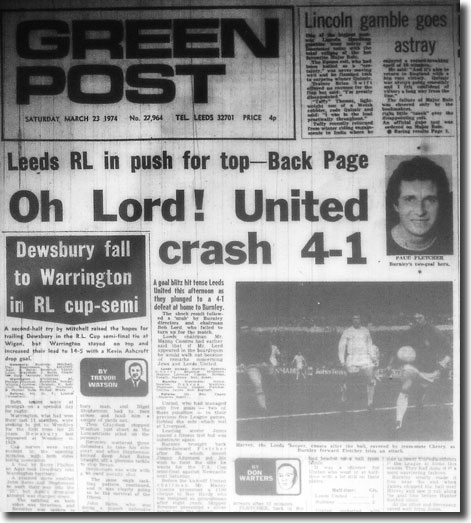 The
dire run of results that preceded Leeds United's home game with
Burnley in March 1974 had left their once unassailable lead at
the top of the First Division looking distinctly brittle.
The
dire run of results that preceded Leeds United's home game with
Burnley in March 1974 had left their once unassailable lead at
the top of the First Division looking distinctly brittle.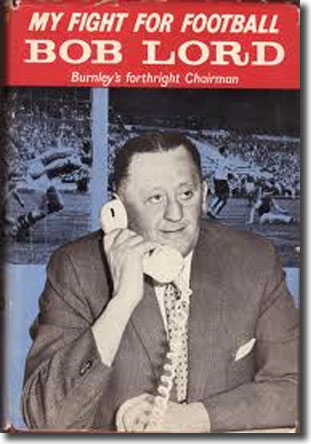 when
Lindsay hoisted a tall lob into the Leeds goalmouth; first Keegan and
then Toshack nodded on the ball instantly as if baton changing and there
was Heighway, quickest of a forest of feet, to slot in the winner. So
a match of electric energy and narrow escapes ended with the heaving Kop
awash with red banners and scarves, like some Technicolor sunset.
when
Lindsay hoisted a tall lob into the Leeds goalmouth; first Keegan and
then Toshack nodded on the ball instantly as if baton changing and there
was Heighway, quickest of a forest of feet, to slot in the winner. So
a match of electric energy and narrow escapes ended with the heaving Kop
awash with red banners and scarves, like some Technicolor sunset.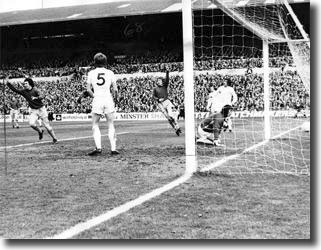 led
to a boycott of Lord's sausages in the town had it not been covered up
for more than three decades.
led
to a boycott of Lord's sausages in the town had it not been covered up
for more than three decades.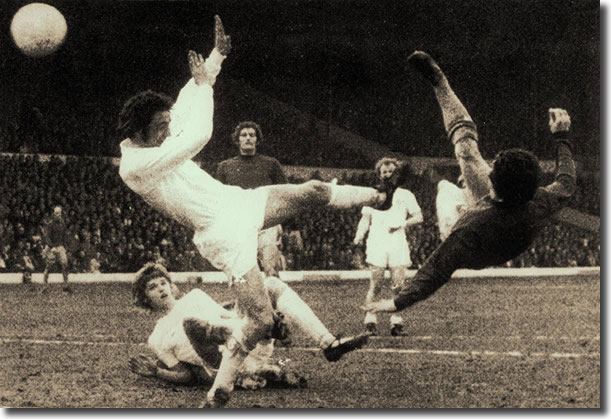 and
the United captain's cross was headed back by Jordan for Allan
Clarke to round Burnley defender Waldron but he fired wide.
and
the United captain's cross was headed back by Jordan for Allan
Clarke to round Burnley defender Waldron but he fired wide.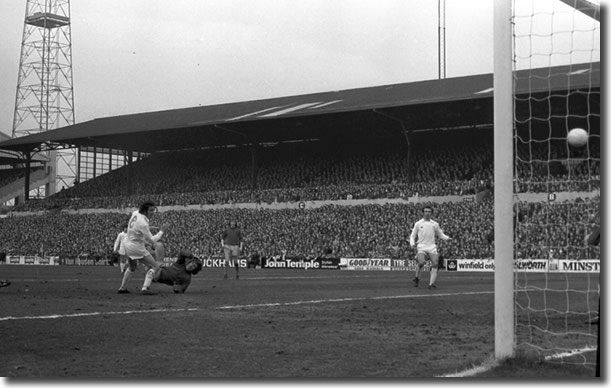 back
on terms, the home team, feeling the strain and tension of recent
weeks, left themselves open by pouring forward in search of a
goal.
back
on terms, the home team, feeling the strain and tension of recent
weeks, left themselves open by pouring forward in search of a
goal.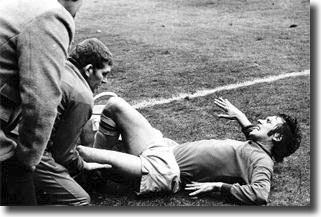 the
Cup semi-final a week later but was a passenger. He made a brief
attempt at a comeback 16 months later, but retired soon afterwards.
the
Cup semi-final a week later but was a passenger. He made a brief
attempt at a comeback 16 months later, but retired soon afterwards.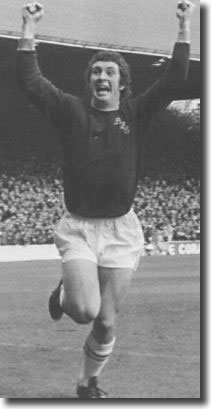 with
the side less assured, gaps are appearing and Burnley exploited them with
cruel efficiency. McQueen, a player with such a long reach that he is
hard to beat when he chooses to assert himself, found Fletcher too much
of a handful and the hard work of Hunter and Bremner could not influence
the tide once it had begun to ebb for Leeds.
with
the side less assured, gaps are appearing and Burnley exploited them with
cruel efficiency. McQueen, a player with such a long reach that he is
hard to beat when he chooses to assert himself, found Fletcher too much
of a handful and the hard work of Hunter and Bremner could not influence
the tide once it had begun to ebb for Leeds.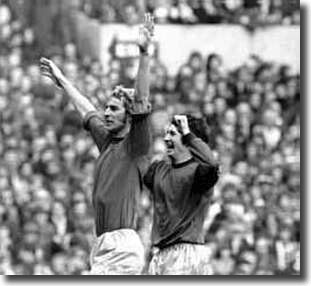 all.
'It will be very tight now, but Liverpool have still to win their two
away games in hand. It is up to us to make the most of our last seven
games,' he said. 'My players are honest enough to know where they are
going wrong. They have been honest with themselves for the past ten years
when disappointments have come along. We have got to forget that Burnley
match and get our heads down and work even harder to change the trend
of results.'
all.
'It will be very tight now, but Liverpool have still to win their two
away games in hand. It is up to us to make the most of our last seven
games,' he said. 'My players are honest enough to know where they are
going wrong. They have been honest with themselves for the past ten years
when disappointments have come along. We have got to forget that Burnley
match and get our heads down and work even harder to change the trend
of results.'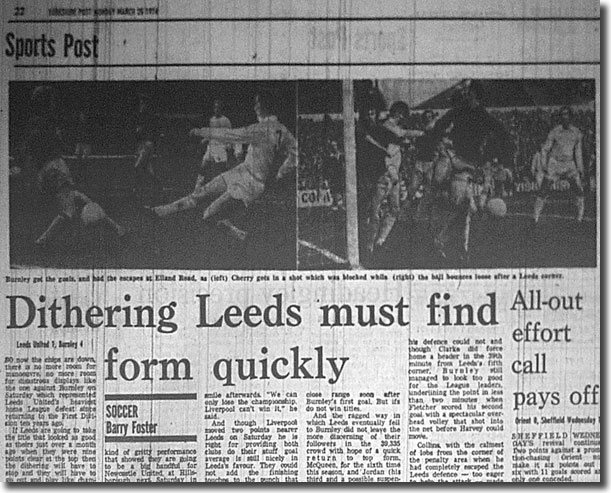 sticky patch, but hoped they would go on to clinch the championship.
sticky patch, but hoped they would go on to clinch the championship.